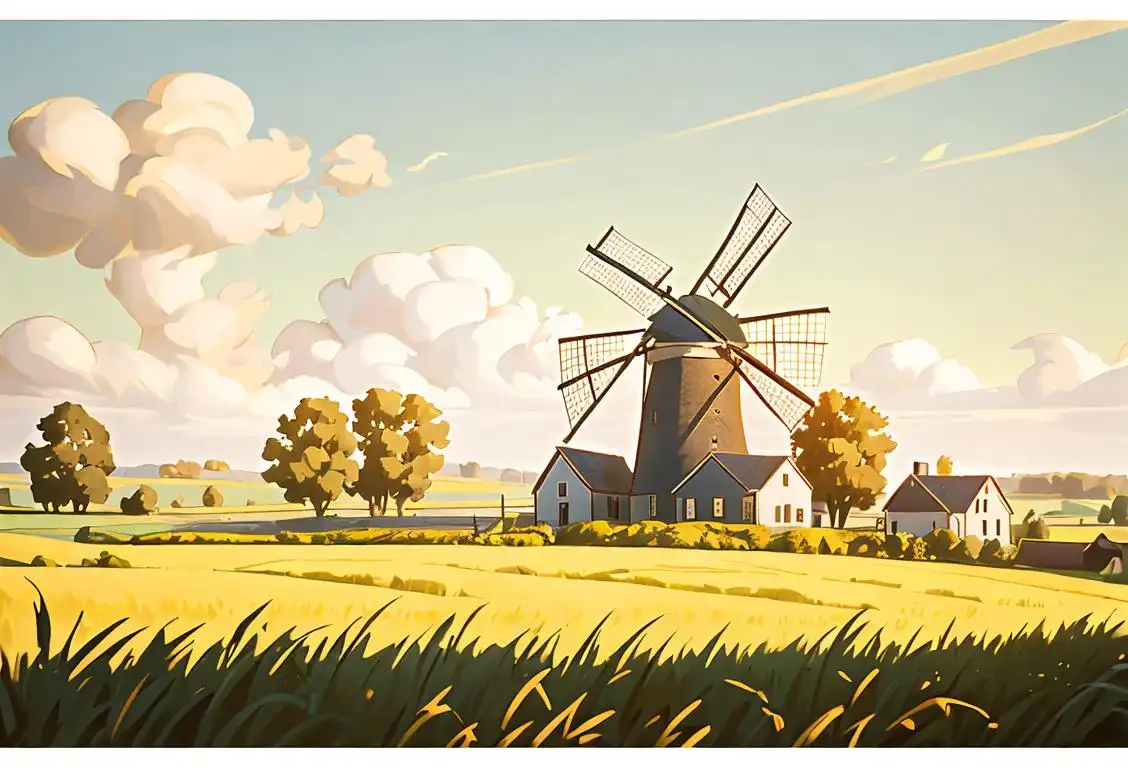National Mill Day

Ah, National Mill Day, the day when we celebrate those massive structures that turn wind into flour. It's a day that takes us back to simpler times, when the sound of creaking gears and the smell of freshly baked bread filled the air. So, grab your favorite loaf of bread and get ready to learn all there is to know about National Mill Day!
When is Mill Day?
It's national mill day on the 11th May.
A Brief History of National Mill Day
Did you know that National Mill Day is actually an event celebrated in the Netherlands? Yes, that's right! It's not just about run-of-the-mill mills, it's about Dutch windmills! Every year on the second Saturday of May, over 950 windmills open their doors to the public, giving them a chance to explore these iconic landmarks and learn about their fascinating history.
The tradition of National Mill Day dates back to 1974 when the Dutch Association for the Preservation of Windmills and Watermills (Molenvereniging) decided to organize an annual event to raise awareness about the importance of preserving these historic structures. Since then, National Mill Day has become a beloved tradition, attracting locals and tourists alike, who can visit working windmills, watch them in action, and even enjoy some freshly ground flour and baked goods.
How to Celebrate National Mill Day
Visiting a windmill on National Mill Day is a must-do if you ever find yourself in the Netherlands. You can explore the inside of a windmill, learn how it operates, and discover the role it played in Dutch history. Some windmills even offer traditional demonstrations, such as sawing timber or crushing grain.
Don't worry if you can't make it to the Netherlands on National Mill Day. You can still celebrate by learning more about windmills, trying your hand at baking with freshly ground flour, or even creating your own miniature windmill craft project at home.
Did You Know?
Did you know that windmills in the Netherlands have names? It’s true! Many windmill owners give their mills unique names, often based on their location or the mill's history. So, the next time you see a windmill in the Netherlands, be sure to ask its name. You might be surprised by the answer!
History behind the term 'Mill'
1225
The Emergence of the Term 'Mill'
The term 'mill' originated in the year 1225 as a noun referring to a building equipped with machinery for grinding grain into flour. This term was derived from the Old English word 'mylen', which itself came from the Proto-Germanic word 'mulīną'. The concept of milling has been an integral part of human civilization for centuries, playing a vital role in the early development of agriculture and food production.
1785
Industrial Revolution and the Rise of Mills
In the late 18th century, the Industrial Revolution brought significant advancements in milling technology and marked a turning point in the history of mills. Watermills, windmills, and later steam-powered mills became increasingly prevalent, revolutionizing the efficiency and scale of grain processing. This transformative era for mills contributed to the rapid industrialization of nations.
1900
Diversification of Milling Industries
By the early 20th century, mills expanded their operations beyond just grain processing. Flour mills, sawmills, textile mills, and various other specialized milling enterprises emerged, catering to specific industries and commodities. The term 'mill' started encompassing a broader definition, representing a wide range of manufacturing processes, becoming a symbol of industrial progress and economic growth.
1970
Transition to Automated Milling
The 1970s witnessed a notable shift in milling practices with the advent of computer-controlled machinery and automation. Traditional mills incorporating manual labor gradually gave way to highly mechanized and computerized mills, minimizing human intervention and significantly increasing productivity. This development enabled mills to handle larger volumes of materials, reaching unprecedented levels of efficiency.
Present
Mills in the Modern Era
Today, mills continue to be integral to various industries, albeit with further advancements in technology and diverse applications. From food processing to paper production, mills play a crucial role in meeting global demand. Additionally, the term 'mill' has also transcended its industrial connotation and is now used metaphorically in phrases such as 'run of the mill' or 'grist for the mill,' reflecting its linguistic evolution and enduring cultural significance.
Did you know?
Did you know that windmills in the Netherlands have names? Many windmill owners give their mills unique names, often based on their location or the mill's history.Tagged
awareness funFirst identified
6th May 2015Most mentioned on
11th May 2019Total mentions
127Other days
Nurses Day
Former Prisoner Of War Recognition Day
Press Day
Handloom Day
Heroes Day
Memorial Day
Dance Day
Bestfriends Day
Liberation Day
Love Your Pet Day









